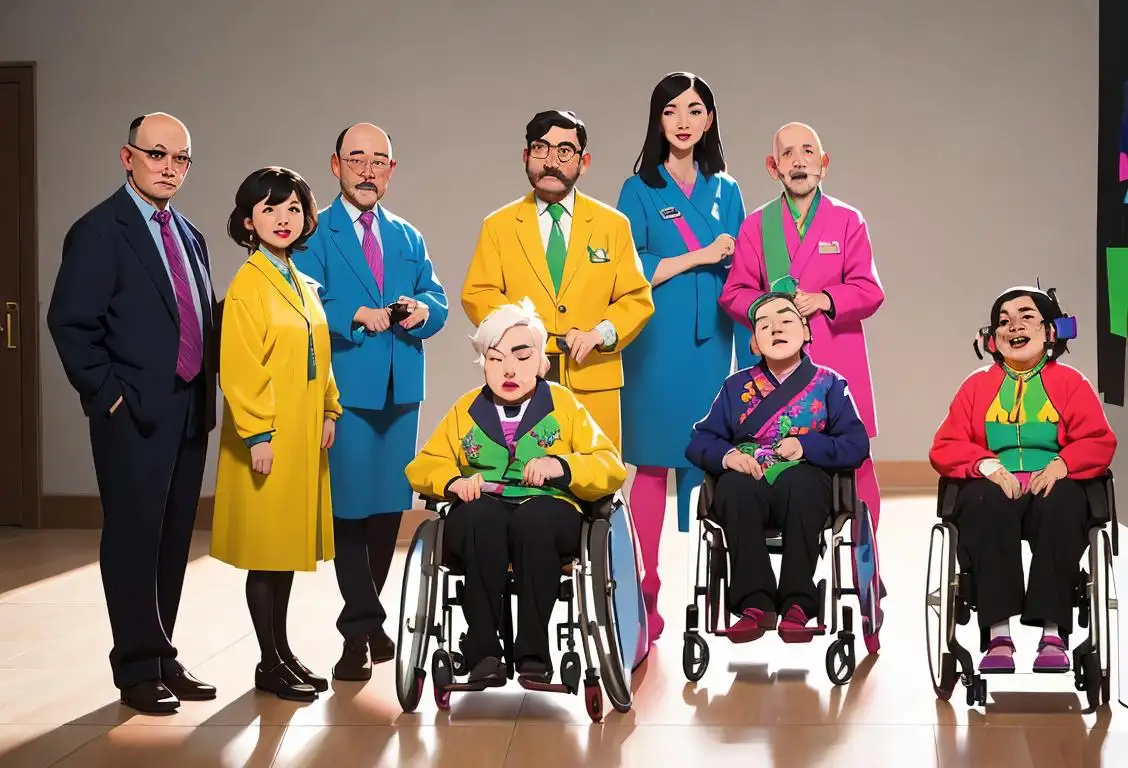National Disabilities Day

Hey there, folks! Get ready to celebrate National Disabilities Day in style! This special day is all about recognizing and supporting individuals with disabilities, so let's dive into the history and significance of this important occasion.
When is Disabilities Day?
It's national disabilities day on the 3rd December.
A Spotlight on National Disabilities Day
Every year on National Disabilities Day, people across the country come together to raise awareness about the challenges faced by individuals with disabilities and to promote inclusivity and equality for all. Whether it's physical, sensory, cognitive, or developmental disabilities, this day serves as a reminder that everyone deserves respect, support, and the opportunity to thrive.
The internet has played a significant role in spreading awareness about National Disabilities Day. Online communities, social media platforms, and various organizations have joined forces to educate the public and share uplifting stories of individuals with disabilities triumphing over adversity.
One of the earliest mentions of National Disabilities Day online can be traced back to December 3, 2017, when it gained a substantial amount of attention. Since then, the internet has continued to be a powerful tool for raising awareness and mobilizing support.
Why is National Disabilities Day Important?
National Disabilities Day is crucial for several reasons. Firstly, it helps break down stereotypes and misconceptions surrounding disabilities. By promoting understanding and empathy, we can create a more inclusive society that embraces diversity in all its forms.
This day also highlights the importance of accessibility. It reminds us that everyone should have equal access to education, employment, healthcare, and recreational activities. Through initiatives and awareness campaigns, National Disabilities Day encourages communities to ensure that their spaces and services are accessible to individuals with disabilities.
How to Celebrate National Disabilities Day
Participating in National Disabilities Day can be as simple as spreading awareness, supporting local organizations, or advocating for disability rights. Here are a few ways to celebrate:
- Volunteer: Offer your time and skills to organizations that support individuals with disabilities. From mentoring programs to community events, your help can make a meaningful difference.
- Engage on Social Media: Take the power of the internet to the next level by sharing stories, resources, and insightful articles related to disabilities. Use hashtags like #NationalDisabilitiesDay to join the conversation.
- Donate: Financially support organizations that work towards improving the lives of individuals with disabilities. Every contribution helps make a positive impact.
- Learn and Educate: Take the time to educate yourself about different types of disabilities, their challenges, and how you can be an ally. By understanding more, you can help break down barriers and foster inclusivity.
Did You Know?
Did you know that the United Nations International Day of Persons with Disabilities, which takes place on December 3rd, is often celebrated as an extension of National Disabilities Day? Double the celebration, double the awareness!
History behind the term 'Disabilities'
1900
Emergence of the term 'disability'
The term 'disability' first emerged around the year 1900. It was used to describe a condition that inhibited a person's physical or mental abilities, impairing their everyday functioning. The concept of disability, however, has been recognized throughout history, with societies finding different ways to classify and approach individuals with impairments.
1975
Development of disability rights movements
The mid-20th century witnessed the rise of disability rights movements around the world. In 1975, the passing of the Education for All Handicapped Children Act in the United States marked a significant turning point. This legislation ensured that children with disabilities had access to a free and appropriate education, setting a precedent for future disability rights movements globally.
1990
Enactment of the Americans with Disabilities Act
In 1990, the Americans with Disabilities Act (ADA) was signed into law in the United States. The ADA prohibits discrimination against individuals with disabilities in various aspects of public life, including employment, transportation, and public accommodations. This landmark legislation played a vital role in shifting societal attitudes toward disabilities and promoting inclusivity.
2006
United Nations Convention on the Rights of Persons with Disabilities
The year 2006 marked a significant milestone in the international recognition of disability rights with the adoption of the United Nations Convention on the Rights of Persons with Disabilities (UNCRPD). The UNCRPD aims to ensure the full enjoyment of human rights and fundamental freedoms by persons with disabilities, promoting their inclusion in society, and combating discrimination.
Present
Ongoing efforts for inclusivity and accessibility
In the present day, there is a growing focus on inclusivity and accessibility for individuals with disabilities. Countries continue to enact legislation and implement policies to ensure equal opportunities and rights for people with disabilities. Accessible infrastructure, assistive technologies, and awareness campaigns play a crucial role in striving for a more inclusive society.
Did you know?
Did you know that the United Nations International Day of Persons with Disabilities, which takes place on December 3rd, is often celebrated as an extension of National Disabilities Day? Double the celebration, double the awareness!Tagged
awareness inclusivity supportFirst identified
3rd December 2017Most mentioned on
3rd December 2017Total mentions
8Other days
Disabilities Day
Transgender Hiv Testing Day
Depression Screening Day
Cancer Survivor Day
Physician Suicide Awareness Day
Peace Officer Memorial Day
Hire A Veteran Day
Suicide Prevention Day
No Smoking Day
Pronouns Day








